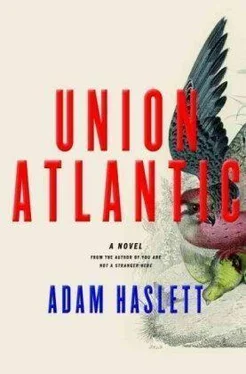“There’s one right there,” Nate said, pointing to the far end of the room.
When Doug had gone inside, Nate instinctively rose to shut the door to the hallway, his heart sprinting, imagining what would happen if Jason or one of the others were to wander in here now. Slowly, his breathing came under control. He tucked his shirt into his shorts and ran a hand through his hair, wishing he’d had the chance to shower after swimming and sweating out in the yard with the dogs. In the mirror, the fabric bunched now at his waist looked queer so he untucked his shirt again and tried pulling his shorts lower on his hips.
When Doug stepped back into the room, Nate noticed that he was pale, as if he hadn’t slept. Strangely, the exhaustion seemed to have removed from his face a layer of his usual indifference.
“So you know the Hollands?”
“Yeah,” Doug replied. “I know them.”
“I stopped by the house a few times. Have you been away?”
“I’ve been busy.”
The thrill of being alone in a room with him again seemed to make everything else fall away. What would it matter if someone did come knocking at the door? This — between them — this was about what they wanted. Not who the desire made them.
Trying to hide his erection, Nate took a seat on the edge of the bed.
Doug paused to inspect the replica of the ocean liner.
It was the SS Normandie . Just over a thousand feet, according to the brass plaque. As long as an aircraft carrier, with a draft as deep, and likely capable of a similar speed, thirty knots or so, complete with the ballrooms and the luxury suites. Such a classy, elegant profile, she had, the stuff of postcards. Capsized dockside in the Hudson, if Doug remembered correctly, and sold for scrap.
“Glenda’s crazy,” he observed. “She thinks she’s some kind of duchess.”
“Mrs. Holland? Yeah. She’s a weird cook too.”
“Let me guess. You’re high as a kite.”
“No — I mean, not really. We smoked earlier but—”
“I need a favor,” he said, examining the fine thread braided into a miniature length of rope and coiled on the ship’s foredeck. “In the old lady’s house. There are papers, records, lots of them, I’m guessing. I need as much about the case as you can get. Are you going to do that for me?”
“I thought it was over.”
“No. We’re just in a new phase.”
He came over to stand in front of Nate. A couple of weeks earlier he’d gone so far as to agree to go to a movie with the kid, even though he knew it would only feed his fantasy of the two of them as actually together. Nate had dressed up in pressed chinos and an ironed shirt; he’d even polished his shoes.
To be that innocent, he thought.
He looked up at Doug with such tender hope.
“What do you want from me?” Doug asked. “You want me to fuck you?”
Nate blushed. “Why are you being so harsh?”
“That’s what you want. Right?”
When he tried to stand up Doug put a hand on his shoulder and pressed him down again; he turned to face the wall. Looking at the kid’s profile, it occurred to Doug how easy it would be to take his head in his hands and with a quick twist of the neck, kill him.
“I swear to God,” Vrieger had said to him once, “I wish I had stabbed every one of those passengers to death. At least then I’d know what we did to them.”
“You think I’m an idiot,” Nate said. “You think just because I keep coming to your house you can say anything you want to me. I’m not as weak as you think. I’ve been through stuff.”
“Okay. Fine. But here’s the question: Are you strong enough to tell me what you want? That’s the test, in the real world. I told you what I want. I want those papers.”
He reached out and cupped the back of Nate’s skull in his hand, pressing his thumb and forefinger into the taut muscles of his neck. Slowly, reluctantly, Nate leaned forward, letting his head come to rest against Doug’s stomach.
“What if I want to tell you that I love you?”
“You don’t love me. I make you hard, that’s all. Which is fine. The rest is daydreaming. But don’t worry,” Doug said, running his hand through Nate’s hair. “I like you.”
“Really?”
“Sure. Why not?”
DAISIES AND MILKWEED and high summer grass scratched at Charlotte’s ankles and shins, catching on the hem of her dress as the crickets and frogs all about her in the field sang in endless oscillation.
They can’t have gone far, she thought, how far could the dogs have gone? Lights from the party died away at the woods’ edge.
“Samuel!” she called into the blackness, dotted here and there by fireflies. “Wilkie!”
Mosquitoes swarmed at her head and along her bare arms she could feel the tingle of gnats. The air itself seemed to sweat, the pores of every living thing opening wide, sap bleeding from the pines, the bushy arrowheads of the grass stalks bursting to seed, the whole warm earth breathing in the darkness.
Her temples still throbbed from the receding cacophony of voices and music. She’d focused as best she could talking to Fanning, as she always tried to in the presence of others, holding fast to the teleological mind, that once broad current that flowed past the lacuna of doubt and random transport. But those organizing arguments dropped away again here.
Stepping into the woods, she reached her hand out and felt the smooth bark of a birch.
“Come along,” she called out to them. “Come along.”
She could barely see her hand in front of her face, the darkness molten now like a closed eyelid’s slow swirl.
Why search? Such pedants and moralists Sam and Wilkie had become. Yet as soon as she imagined being without them the feeling of loneliness bit at her. She had been nearly cured of that disease before they had come along. She had been content in solitude. Her soul kept alive by the leaps of incandescence that now and then hallowed intervals otherwise inconsequent: the rhythm of words singing off a page, a sonata turning time into feeling, a landscape on a canvas so caught as to grant one brief respite from the fear of total neutrality. These were the body and blood of her faith in the world. What the utilitarians and the materialists and the swallowers of all the cheap scientism would never understand: that the privilege of walking by the river in nature’s company owed as much to a mind trained by poetry and painting — of Protestant plainsong or Romantic largesse — as to any quiddity of nature’s own. You walked through the painting. You saw through the poem. Imagination created experience, not matter alone.
“Wilkie!”
If they went too far they might reach the road, where they could be hit by a car or cut their paws on glass.
Somewhere in the distance, she heard a young woman’s cry. She turned, seeing nothing but darkness behind her. All of a sudden, there was a terrible beating of wings and she felt the stiff tips of feathers brush against her arm as a bird took off right beside her, a crow by the sound of the call it made as it veered up and away. She began walking more quickly, her breathing growing heavy again, the back of her dress soaked through with sweat. Roots protruding from the ground and the low branches of the pines made the going hard. Just as she saw what she thought were lights up ahead, she felt a sharp nick on her leg and shifted to her right to avoid it only to feel another stab on her wrist. Frightened, she reached her arms out in front of her, and started moving faster still.
THE GUESTS, stuffed and drunk, had at last been herded out onto the lawn for the fireworks, the flush-faced town collegians on break from summer internships grabbing their third or fourth glasses of champagne as the foreign investors trailed after them remarking to themselves that no matter how weak the dollar or poorly managed the public fisc, really you couldn’t beat the States for all the sights to see. And there, teetering on a riser overlooking the pond stood Glenda Holland soused to the gills, trying to shush the players who’d already struck up the opening largo of the 1812 Overture .
Читать дальше












